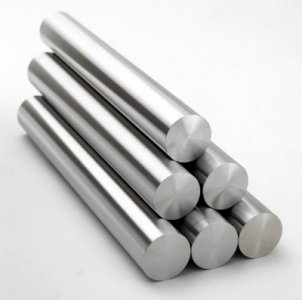Titan

General Characteristics
Titanium is a light, silvery metal, element number 22 of group IV of the Mendeleev periodic system. It was discovered in the late 18th century independently by the Englishman W. Gregor and the German chemist Klaproth. At that time titanium was already nicknamed as "the metal of the future", because of its extraordinary characteristics. Its durability is akin to the durability of mace, at the same time it is much lighter than other metals, resistant to corrosion and aggressive environments, easy to forge and stamp. Its corrosion resistance is higher than that of the noble metal alloys, and its low specific weight is comparable with aluminum. Low creep of titanium is similar to stainless steel, and extensibility and ductility are at the level of those of copper. It retains its qualities from -250°C to the red hot temperatures of steel. Exceptional specific strength, wear resistance, heat resistance have made it an irreplaceable material at the forefront of the 21st century industry.
Physical qualities
| Description | Designation |
|---|---|
| Temperature at which the specified properties were obtained t°С | 20°С |
| Coefficient of linear thermal expansion α [1/Grad] | 8,2x10-6 |
| Density [g/cm3] 4,45 | 4,45 |
| Modulus of elasticity of the first kind, E [MPa]x10-5 | 1,12 |
| Specific heat capacity at 20 °C C [kJ/(kg-grad)] | 0,586 |
| Heat conductivity K [W/(m-K) | 300,173 |
| Kcoefficient of thermal conductivity), l [W/(m-rad)] 8,37 | 8,37 |
Production
The basic method for producing titanium is the reduction of TiCl4 at high temperatures with sodium or magnesium. Hot titanium easily reacts with atmospheric gases, so the main purpose of production technology is to minimize the contact of hot metal with N2, O2, H2. The main drawback is that the process is expensive and energy-consuming. In metal science, titanium alloys are classified by crystal lattice configuration: β-state (cube-shaped), α-state (hexahedron-shaped) and α+β (mixed state). According to the method of processing alloys are divided into foundry and deformable.
Storage
Titanium rolled products are stored in covered warehouses or under sheds, where proper protection against mechanical and other types of damage is provided.
Applications
Titanium is used in the production of alloys for rocket and aircraft engineering. Lightness and heat resistance of titanium allows its application in manufacturing thermal equipment. It is in demand in the cryogenic industry since it retains high ductility and strength in extreme cold conditions. Titanium alloys are used in production of the most critical parts for shipbuilding, including hulls and propellers of underwater vessels. Its biological inertness makes it possible to create structural materials for reconstructive surgery and use in food and pharmaceutical industries. Titanium is used to make body armor and in modern design. Thanks to biological inertness, titanium serves to create surgical instruments and prostheses.
Buy at a bargain price
Evek GmbH always has a wide range of high-quality rolled titanium on stock. We sell wholesale and retail products at optimal prices. The quality is guaranteed by the strict compliance with the standards and production technology. Technical documentation includes data on chemical composition of products, maximum percentage of impurities and mechanical properties. The products are ultrasonically checked for defects. Consultations of experienced managers will help you to make a choice. Implementation of orders - in the shortest possible time. Wholesalers receive preferential discounts.
